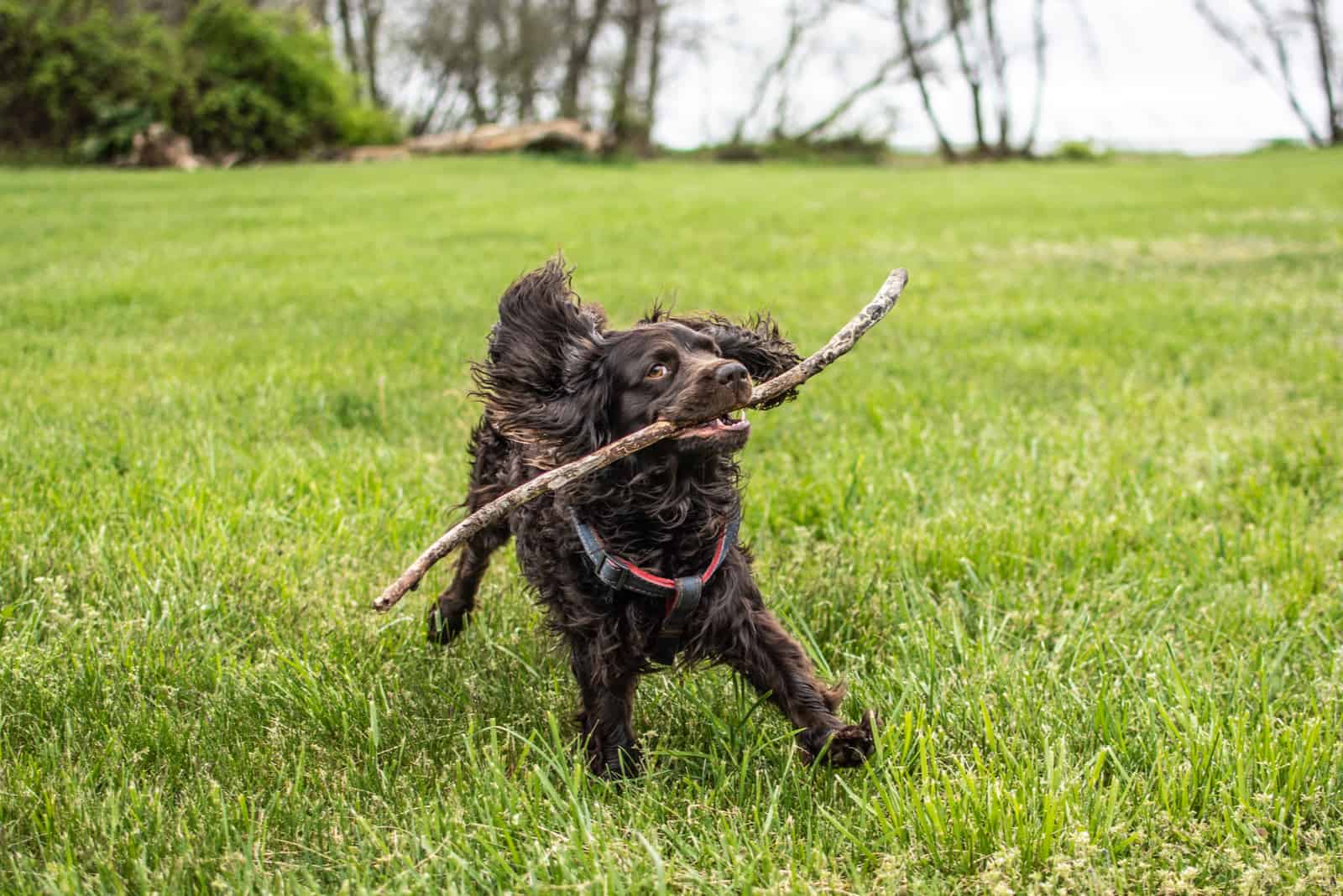Training is an essential part of owning a dog. You cannot expect to have a well-behaved pup if you don’t invest time to teach them some things. Think of it as a school for doggies.
It is very important to start dog training as soon as possible. The sooner you start, the better results you will see. However, if you are a first-time dog owner , training your puppy can be really overwhelming and stressful sometimes.
The Boykin Spaniel is an American breed, born and bred in Spartanburg , South Carolina . These little brown dogs are one of the latest American Kennel Club ( AKC ) enrolled dog breeds that received its full recognition in 2009.
They are incredible as pets as well as being versatile working dogs — hunting dogs, bird dogs, gun dogs, waterfowl retrievers… they can be all.
These beautiful and sweet dogs are also extremely cheerful, energetic, and enthusiastic, which means they need a lot of exercise and mental stimulation. In order for them to be the best possible family dogs, they need a proper training program and someone who can guide them.
If you don’t know where to start or even what to do, don’t worry – we are here to guide you through the nits and grits of Boykin Spaniel training . Keep reading to find out how to become the best Boykin Spaniel trainer!
Boykin Spaniel Training 101 — An Overview
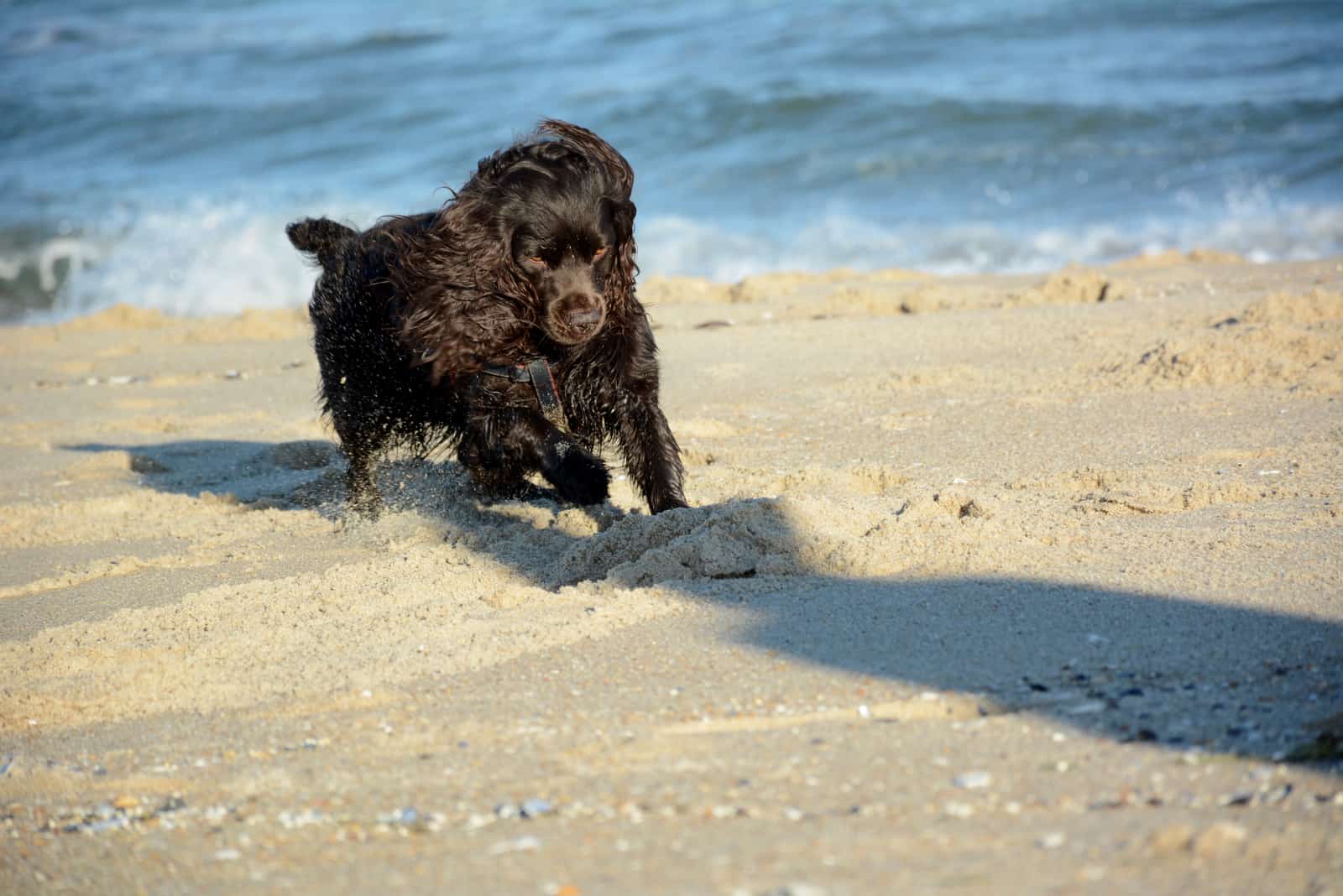
Understanding the dog’s behavior and the training methods is essential to a successful training process. Before you even start thinking about training your Boykin Spaniel puppy , it is important to educate yourself on the matter.
To help you with your Boykin Spaniel training , we present you a little guide with the most important aspects of training that you need to be aware of before you start educating your pooch:
Introducing Your Puppy
Many new owners have a lot of unanswered questions, such as what do you do with your puppy when you first bring it home? Usually, you will get to bring your pup home when it is eight weeks old, which is still pretty small.
When they are that small and young, the most important thing is to introduce them to a lot of new things. Early socialization is probably the most important step in making your dog well-behaved and well-rounded.
So, try to take them outside as much as you can, get them to experience interactions with different animals, people, children, dogs, and noises. Try to show them new things, and take them everywhere with you. This will significantly influence their behavior in the future.
Training Techniques
When it comes to the actual training program, it is important to know some of the techniques and strategies that are specific to the Boykin Spaniel breed .
Don’t do long training sessions with Boykin Spaniels since those can be boring to them. It is better to do them more frequently, but in shorter time periods . Professional dog trainers advise that you do five minutes of training three to five times per day.
Be consistent with your training because it will help them develop discipline, and also get them to have a sense of routine.
Try not to make the mistake of letting the Boykin Spaniel puppies do some things that will not be allowed later on. We all know they are cute and hard to resist, but this will send completely mixed signals to the pups, and it will be very difficult to change this in the future.
Positive Reinforcement
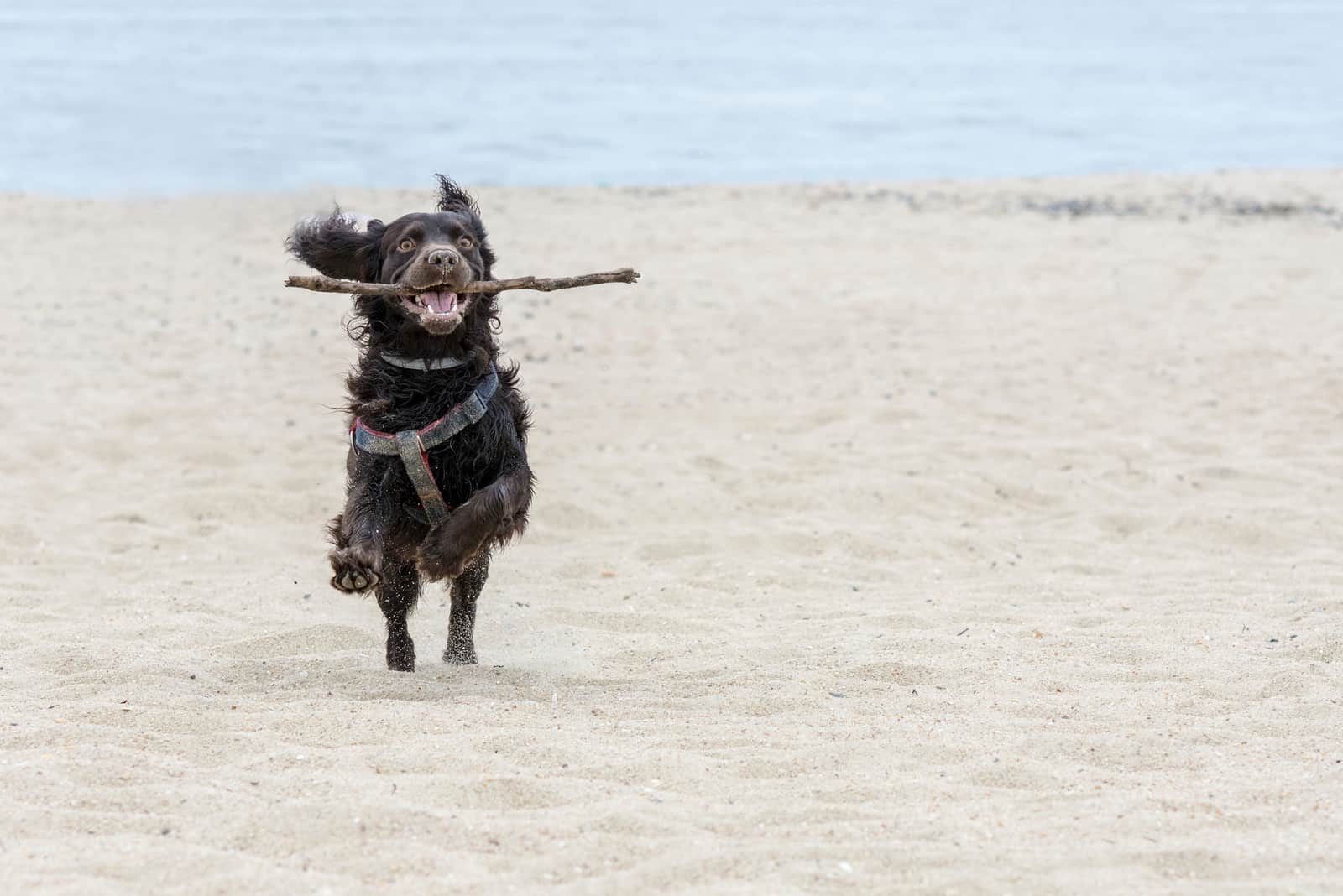
Positive reinforcement is the best approach to training this South Carolina state dog . This means that you reward your pup (with food, treats, toys) every time they do something good, which will then hopefully encourage the said positive behavior.
This reward serves as a motivator for dogs to respond well to training and learning . Remember to always be calm and collected while going through the training program , and don’t use harsh punishments as they might lose interest. Never reward negative behavior!
Leash Training
As we have already mentioned, these South Carolina little brown dogs were bred to be hunting dogs among their many other qualities. Their high prey instinct is one of the main reasons why they need to be leash trained.
Extreme curiosity, high energy levels, and hunting instincts are a great recipe for a dog that likes to chase other animals. If not on a leash, these pups will often run away from you and chase some small animals.
Make sure to find a good and appropriate dog leash for your pup. Start first with getting him used to the collar and the leash before you try going for a walk.
Dominant Behavior
Boykin Spaniels , like many other dogs, require a strong and dominant figure while training . It is important for them to realize that you are the boss, and they need to follow your commands; otherwise, you will have problems with even basic obedience training .
However, don’t forget to give your pup lots of love and affection also. They are an affectionate breed that requires a lot of love from their owner and trainers, and when they receive it, they will be more than eager to follow your command and learn pretty much anything.
Recommended: How To Show Dominance To A Dog? 17 Steps To Be An Alpha Leader
Understanding The Boykin Spaniel
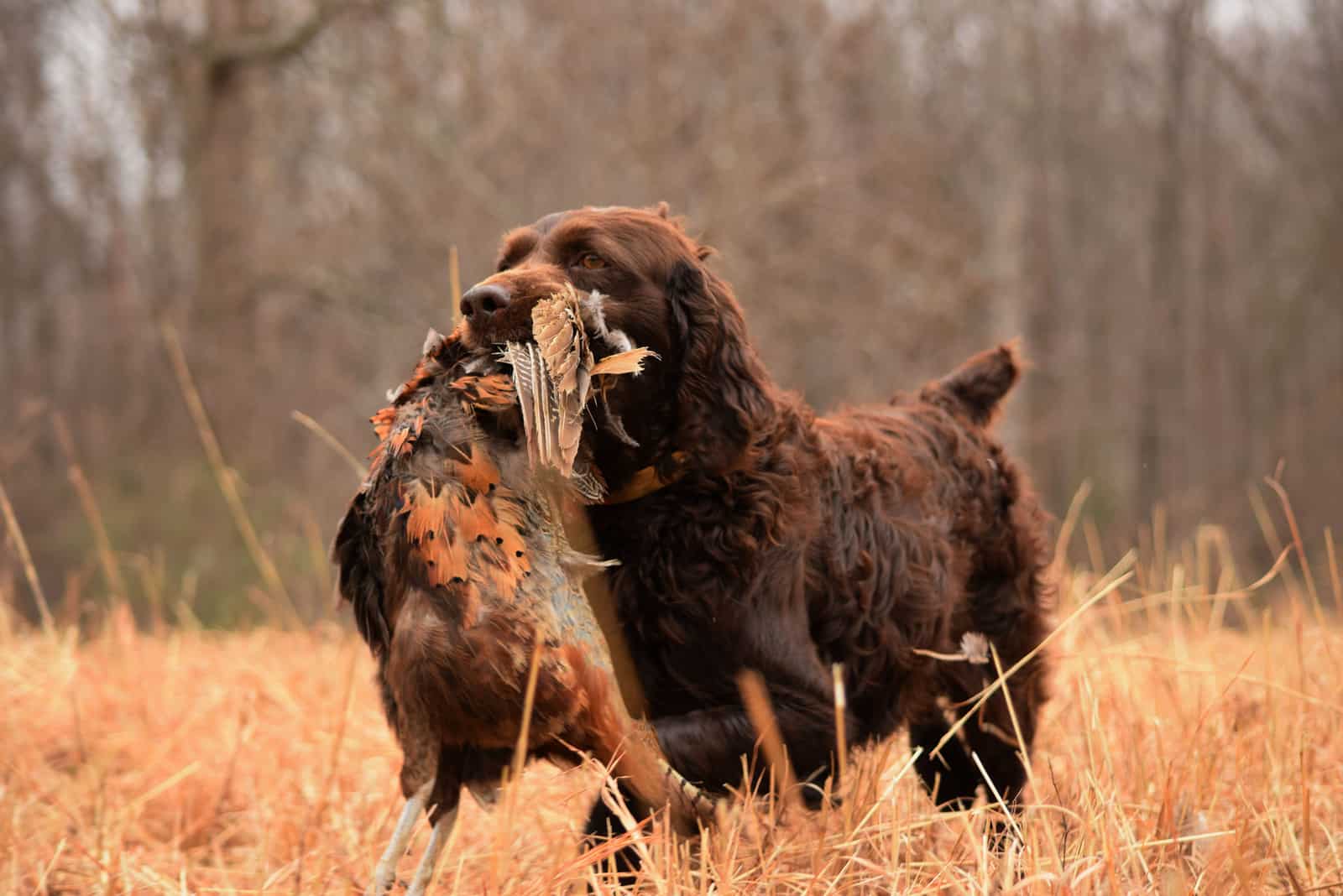
These pups are true little hustlers. With their eagerness and fantastic skills (plus a little bit of retriever training ), they can do nearly anything. Did you know that these dogs are also known as turkey hunters? This is a job that no other breed has even tried to do.
Regarding their size, Boykin Spaniels are about the same size as English Springer Spaniels or English Cocker Spaniels. The Boykin Spaniel Society ( BSS ) states that the breed standard should be a medium-sized dog — 15 to 18 inches tall, and weighing 30 to 40 pounds.
Although they were originally bred to be bird hunting dogs (and even won a lot of AKC / UKC hunt test titles), today, they are no longer bred for such a cause. Their friendly, outgoing, and eager-to-please personality also make them great family dogs .
If you plan to get a Boykin Spaniel puppy , please go with one of the reputable Boykin Spaniel breeders since unfortunately, these pups are also known for having a really high rate of hip dysplasia .
Are Boykin Spaniels Easy To Train?
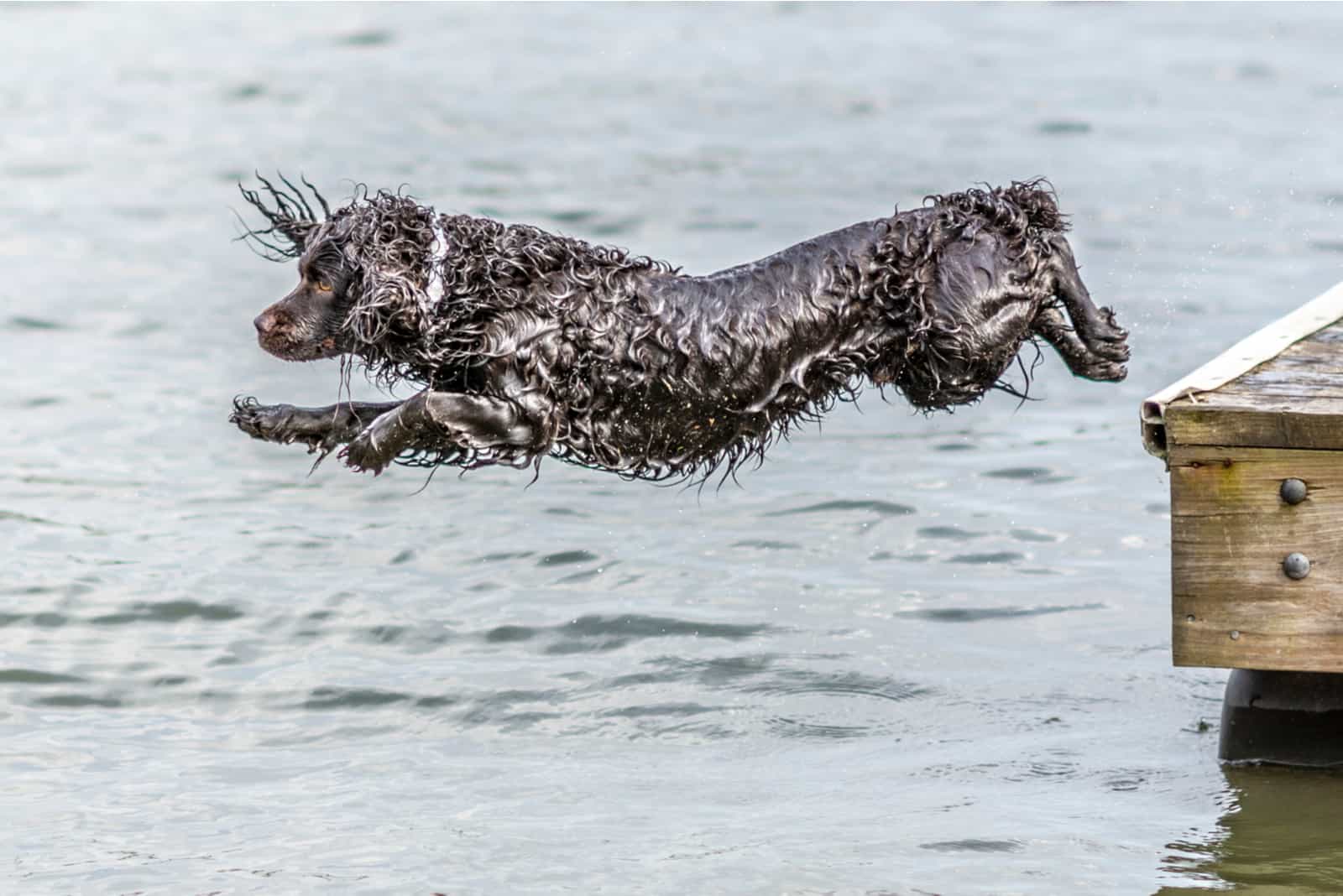
Boykin Spaniels , like most Spaniel breed dogs, are very energetic, fit, and athletic. Due to their energetic side, they might seem difficult to train, but the truth is completely different.
They are extremely eager and intelligent , which makes them a great prospect for training. Many dog owners have rated Boykins as one of the best dogs when it comes to trainability. They usually have a very obedient nature, and will quickly learn new tricks and commands.
However, like most dogs, they also need a firm and steady hand to guide them. You, as their trainer, need to be confident and “dominant” in order to train them properly.
It is important to implement this kind of relationship from the beginning in order to properly set boundaries for the future.
These dogs absolutely love training , which makes the process much easier for both the owner and the puppy. However, you can still encounter some behavioral problems during the puppy stage; for example, chewing, which is completely normal and can be seen in many dogs.
Boykin Spaniels require a lot of exercise and mental stimulation , so extensive training and challenges won’t be a problem at all for them. With a little bit of training, these pups can be loving and affectionate family pets that get along well with children and other people.
How Do You Crate Train A Boykin Spaniel?
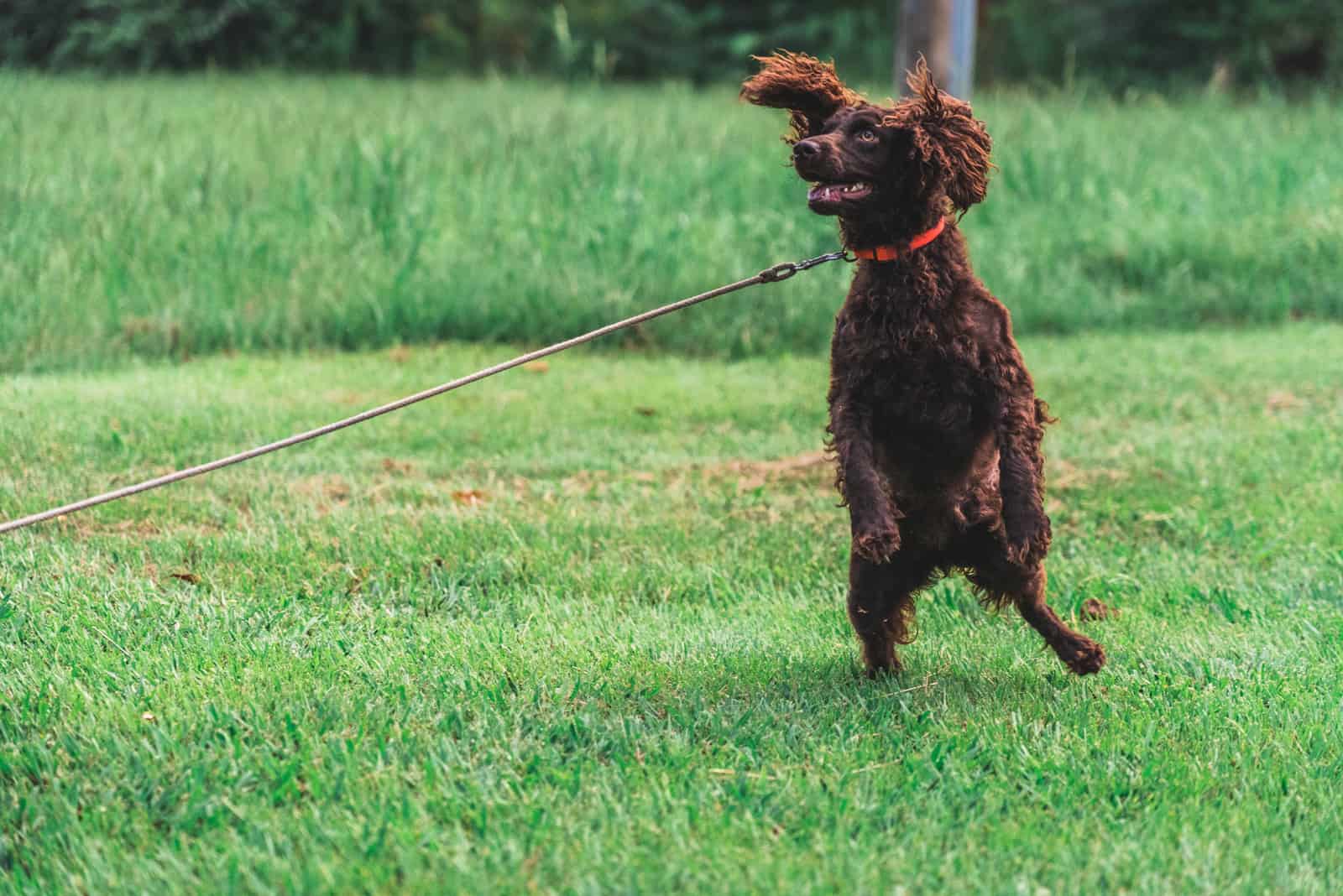
Even though many people consider crate training and crates in general as a cruel way to treat dogs, this is completely untrue. If you don’t treat these crates as a dog prison, there is nothing wrong with using them in your dog’s life.
Before even trying to crate train your Boykin Spaniel , you first have to make sure that you have a properly-sized crate that would fit your Boykin pup perfectly.
There are different types of crates, but no matter which one you choose, the most important thing is that the said crate is spacious enough. This would mean that your Boykin Spaniel can stand up, turn around, and lie down comfortably in it.
Crate Training Tips And Tricks
First and foremost, you need to make crate training a positive experience . The dog has to associate the crate with all good things, such as a kind voice, food, and treats. All of this will make your pup happy to stay there and not develop severe separation anxiety .
If you are trying to crate train a puppy, you must know that they shouldn’t be left inside for more than two hours , whereas adult Boykin Spaniels can last up to four hours . At the beginning of the training, always leave the crate door open, so the pup can get used to it without being scared.
Place a nice and comfortable dog bed inside the crate to make it cozier and more charming, so the pup would want to go inside by himself. Another great tip to achieve a positive reaction is to feed your dog inside the crate. Food is the best motivator.
Once you get your dog used to the existence of the crate, you can start with implementing a command for an entrance. You should use something short like “INSIDE”, “IN”, or “CRATE” , and always use a kind and sweet voice.
Combine these commands with feeding him inside the crate, and soon your puppy should go inside by himself when he hears those words. Always remember to reward the dog with something if he did what you were training him for.
Related: Puppy Crying At Night In The Crate: Everything You Need To Know
Boykin Spaniel Potty Training
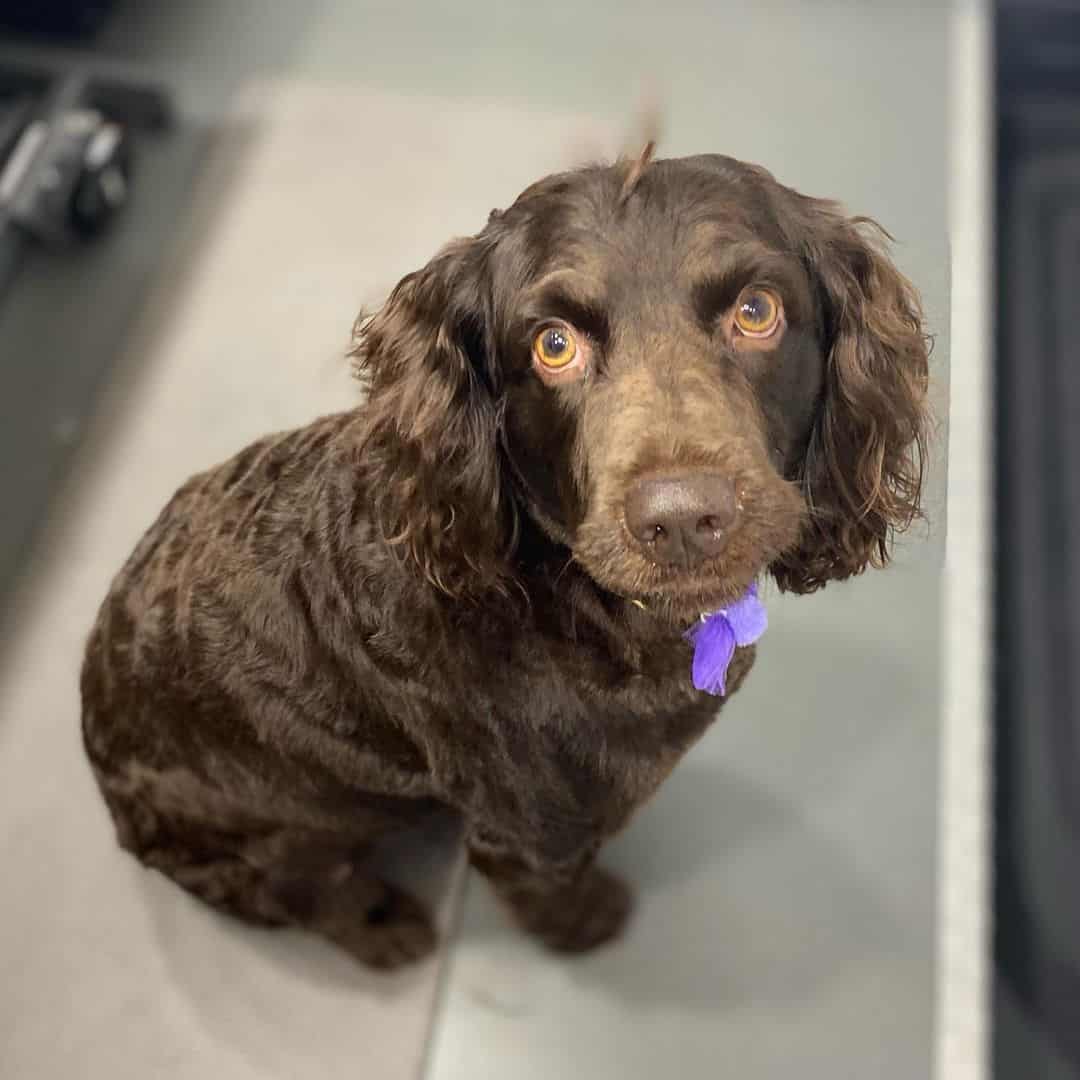
Photo from: @jacks_the_boykin
Potty training, also called housebreaking, is perhaps one of the most important steps in the training process, and definitely one of the first things you have to teach your Boykin Spaniel puppy .
This basically means teaching your puppy not to pee or poop inside the house. Of course, in the beginning, young puppies will probably have a couple of accidents, so if you do not want this to become a habit, you must train your pup.
Related: Puppy Pees A Lot: Why This Happens And How You Can Help
The best time to start potty training your Boykin Spaniel puppy is around eight to twelve weeks , which is usually also the time when you bring the puppy home from the breeder .
Sometimes, it could happen that the breeder has already done this, but if that is not the case, you will have to do it.
Frequency
When you have a young puppy, he or she is still not fully developed, and they have trouble holding their urges, which is why you might experience a lot of accidents.
If you don’t want to clean yet another puddle of pee or a pile of poop, a good idea would be to take your puppy out as frequently as possible.
If you have the time, try taking your puppy out every hour or so , and wait a little bit outside with them to see if anything will happen.
This is extremely important even if the pup doesn’t go potty – they will at least start to get used to going out. If they have indeed used the toilet outside, don’t forget to reward this good behavior, so that the dog knows he is doing something right.
Observation
An important step in your dog’s house training is to observe your pup’s behavior and learn the signs that imply he needs to go potty . Usually, the dog’s body language is a dead giveaway if your dog needs to go to the bathroom.
These signs include sniffing, circling, barking, squatting, waiting at the door, and so on. Your pup might also have some unique ways of showing it. If you notice any of these signs, you need to hurry up and take your pup outside.
As I have said before, you must reward your puppy for his good behavior; give him lots of appreciation or some treats. If nothing happened, you must never shout at the dog or punish him in any way; otherwise, he will just get scared.
Routine
With any kind of puppy, training is important to set a routine, especially when trying to potty train. Dogs thrive on a schedule, so this significantly makes training much easier.
If it is possible, try to make a daily schedule and stick to it . This would mean that you take your pup out at around the same time each day. By doing this, your dog will eventually learn to adapt his needs to it.
You should take your dog out first thing in the morning, and after meals, drinking, exercise, and playtime. If you reward him with positive feedback each time he goes potty , your puppy will soon learn how to be fully potty -trained.
Read also: Help, My Dog Is 6 Months Old And Not Potty Trained!
FAQs
1. How Do I Teach My Boykin Spaniel To Come When Called?
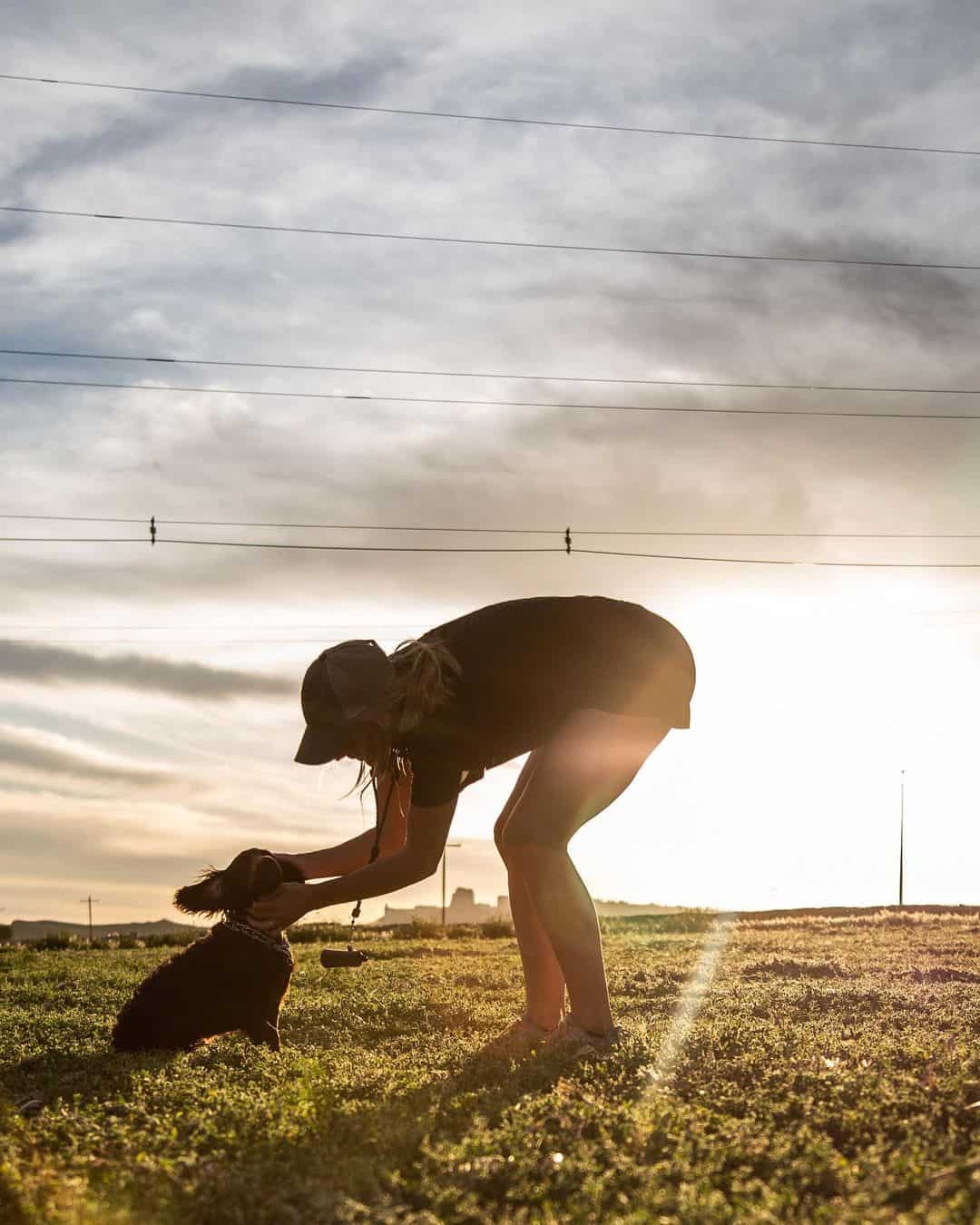
Photo from: @austinkaufman12
• In order to properly teach your Boykin Spaniel to come when called, you need to start the training in a closed environment ; for example, your house, where there are not a lot of distractions.
• You get the best and the fastest results if you start teaching them early on, and when you practice every day.
• Positive reinforcement is the key again here . Using something like their favorite food, treat, or toys should also work as a motivator.
• Make sure to always use a happy and high-pitched voice for a cue that can be something like “COME” or “HERE”, and reward them each time they come all the way to you.
• Do not ever scold or punish your dog for disobeying – try to make this experience as positive as possible.
2. How Do I Train My Boykin Spaniel Not To Bark?
There are a couple of training methods that can help you stop your dog’s annoying barking:
• Teach your pup the “QUIET” command. Use a calm, but firm voice, and always reward your dog’s good behavior.
• If your dog is constantly barking to get your attention, try to ignore it and don’t respond to it. Only when your dog is quiet should you do what they want. But, make sure to reward them for their quiet behavior, so they know what is more desirable.
• Make sure that your dog is well exercised, so that they spend most of the time resting calmly rather than barking out of boredom.
• Properly socialize your dog from an early age . This way, they will be used to different people, children, animals, and other dogs, and they will less likely bark at them.
• Remove any unwanted objects or things that make your dog nervous, and therefore, bark.
Read also: Why Is My Dog Barking At Nothing?
3. How Do You Stop A Boykin Spaniel From Chewing Things?
Young puppies usually have a habit of chewing everything in sight. In order to stop it, you need to:
• Provide them with safe chewing alternatives , such as chewy treats, toys, dog bones, etc.
• Use a calm, but firm voice to teach them commands, such as “ NO” or “ LEAVE IT” every time you see them try to chew something. Take the undesirable chewing option and replace it with a safe one, and don’t forget to reward them for their good behavior.
• Doggy-proof your house , so your pup will not be able to come anywhere near any of your prized possessions.
• You can spray the objects that you don’t want your dog to chew on with a doggy-safe spray that will not harm them, but will taste awful and hopefully wean them from chewing.
• Do not ever use harsh teaching methods such as screaming, punishing, or hitting because that will just cause more stress and more destructive behavior in the future.
To Sum Up
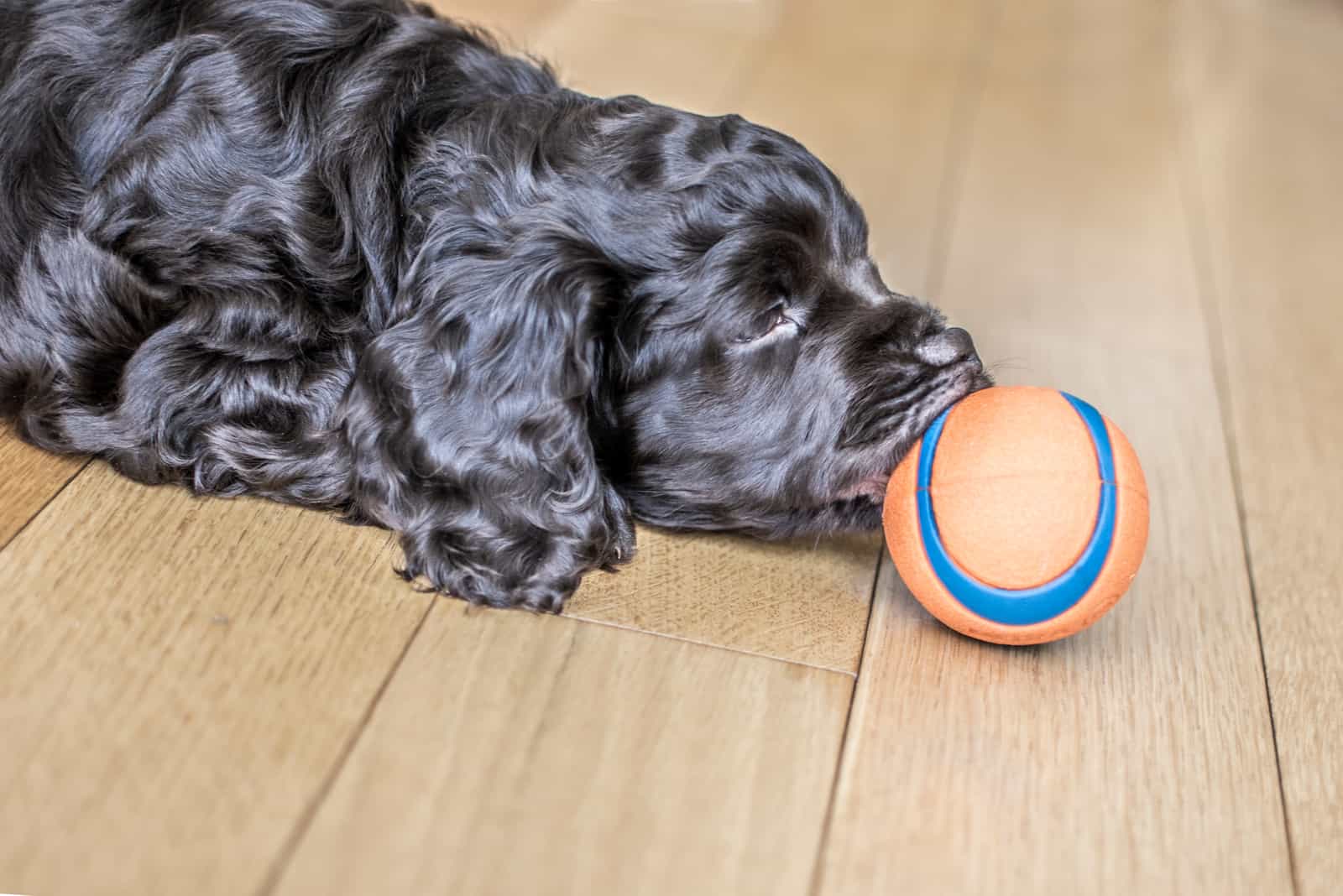
If I could sum up everything about Boykin Spaniel training in one sentence, I would, but this is a pretty broad subject that needs a lot of care. Training a puppy is a serious matter, and it should be treated as such.
Dogs are not our toys, but loving members of our family that require a lot of attention and care. It is highly important that you educate yourself in this since incorrect training can often result in more behavioral issues and problems.
Although they are easy to train, make sure that you do it correctly first and foremost, so that you are able to bring all their wonderful qualities to the surface.
Related Content:
• Belgian Malinois Training: The Do’s And Don’ts Of Training
